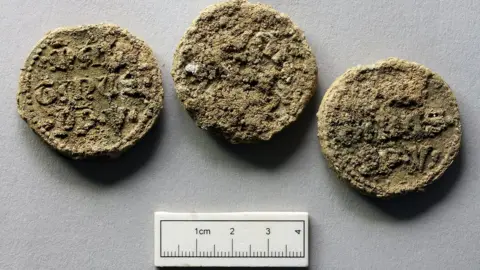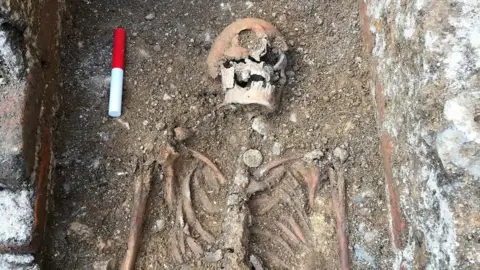St Albans Cathedral: Remains of Abbot John of Wheathampstead to be reburied
 Facelab
FacelabThe remains of a 15th Century abbot found in an unmarked grave at St Albans Cathedral are set to be reburied inside the building.
A skeleton unearthed in 2017 during the building of the cathedral's new welcome centre was later found to be that of Abbot John of Wheathampstead, who died in 1465.
He will be laid to rest again next to the Shrine of St Alban on Saturday.
Dean of St Albans, Jo Kelly-Moore, said it was "an historic moment".
St Albans Cathedral stands on the site where Britain's first saint, St Alban, was martyred by the Romans and is the oldest place of continuous Christian worship in the country.
Abbot John's burial site remained undiscovered for centuries until excavation work uncovered his remains.
 St Albans Cathedral
St Albans CathedralHis skeleton was unearthed along with three papal bulls - a type of public charter issued by a pontiff - that Pope Martin V had given him 40 years before, confirming the papal privileges he gained in 1423 - and providing the key to his identity.
In a service of choral evensong, Abbot John will be placed with his friend and colleague Humphrey, Duke of Gloucester, in the Chantry Chapel.
The Very Reverend Jo Kelly-Moore said it would be a "very special and historic service".
"We will be reburying the earthly remains of Abbot John of Wheathampstead, one of the most influential 15th Century Benedictine abbots - abbot here at St Albans Abbey twice," she said.
"This is an historic moment, not only for St Albans Cathedral but for our nation as well."

Abbot John of Wheathampstead (1390 - 1465)
 St Albans Cathedral
St Albans Cathedral- John of Wheathampstead was abbot at St Albans Cathedral twice, from 1420 to 1440 and from 1451 until his death in 1465
- He was influential, introducing internal reforms, promoting the abbey's property interests and securing papal privileges
- One of the leading Benedictine abbots in England, he represented the English clergy at international conferences, such as the one held in Pavia, Italy, in 1423
Source: St Albans Cathedral

A facial reconstruction revealed in 2020 was based upon his skull, which the cathedral said had been preserved well enough for this work to be carried out.
It is claimed to be the first face of a 15th Century figure to be revealed in this way since Richard III's in 2013.

Find BBC News: East of England on Facebook, Instagram and Twitter. If you have a story suggestion email [email protected]
